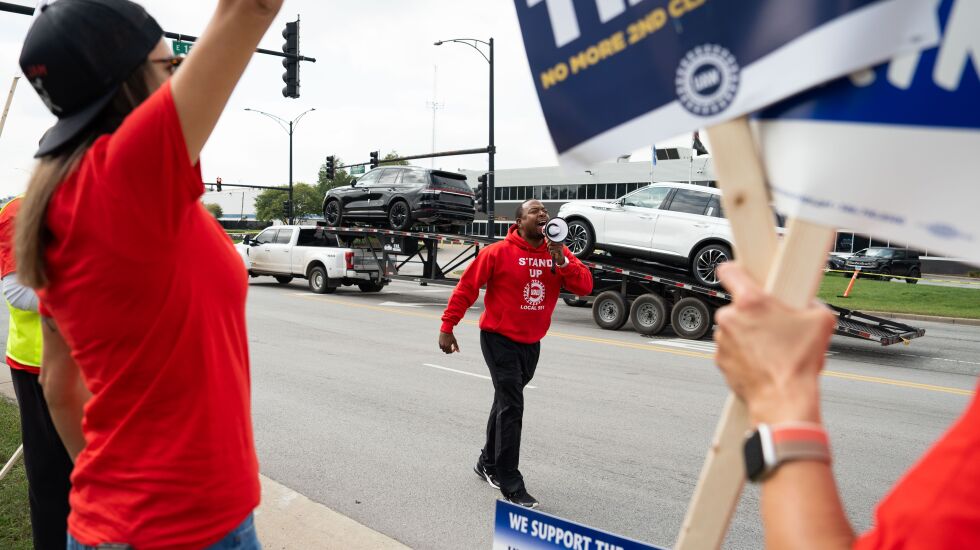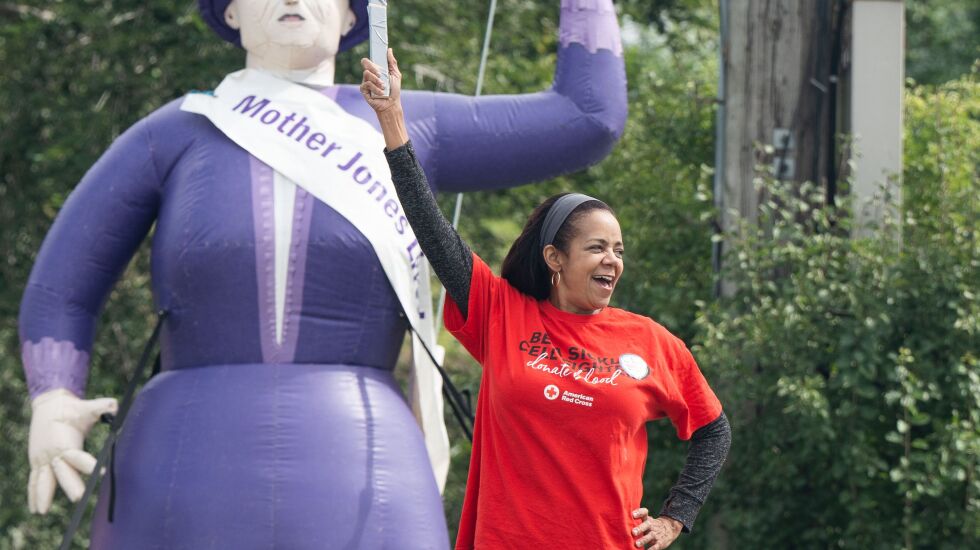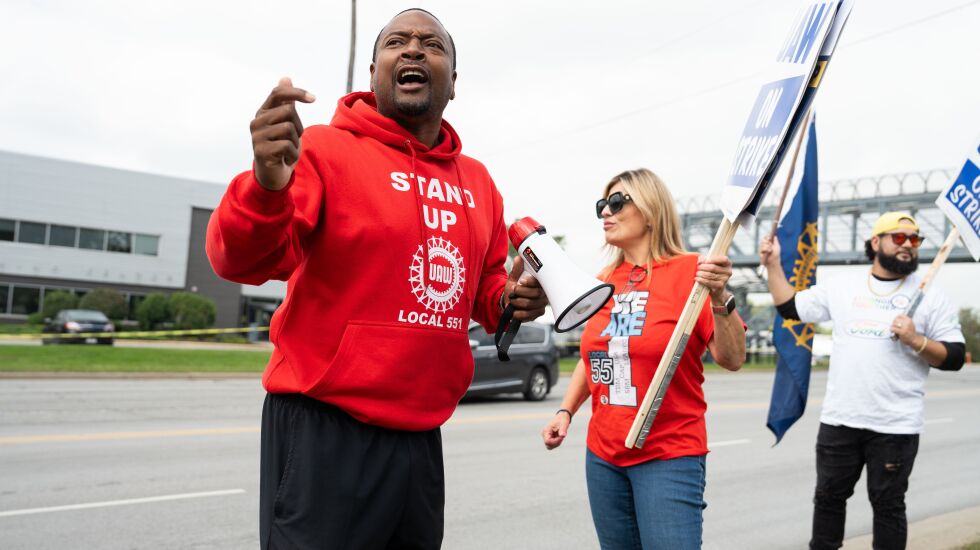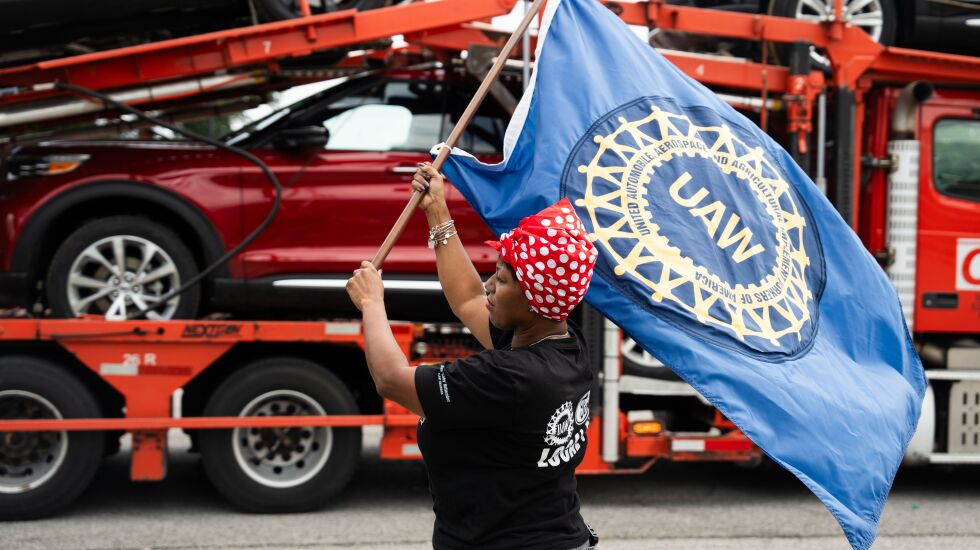
Felicia Greene, 56, was fist bumping her coworkers Friday while saying, “We are one!” and joining in chants called out on a bullhorn outside of Ford’s South Side assembly plant.
Greene and her colleagues were joining the United Auto Workers’ expanded strike action that started at 11 a.m. Union President Shawn Fain made the announcement about the strike on Facebook Live, ordering 7,000 more workers to walk off the job in Chicago and at a General Motors plant near Lansing, Michigan.
It’s the third Illinois location to picket after the UAW broadened its strike last week to include a GM location in Bolingbrook and a Stellantis site in Naperville, both parts distribution sites. The new walkout does not include a Ford stamping plant in Chicago Heights.
About 25,000, or around 17%, of the union’s 146,000 workers at the three automakers are now on strike, allowing it to preserve a strike fund worth $825 million before Sept. 14.
Greene, a final line inspector, has been working at the plant since 1993. She said she was proud to be part of such an inspiring moment.
“I don’t even know how to describe it; it’s just surreal. I have never felt this energy for this company in 30 years,” Greene said. “We’re not wishing the corporate people any bad. We’re fighting for our rights. We’re fighting for fair wages.”

Jason Wachowski, vice president of UAW Local 551, the union representing workers at the Chicago Ford plant, said employees have only seen a 6% increase in wages since 2007.
Many workers have taken on second and third jobs to make a livable wage, Wachowski, 45, said, adding that it negatively affects the whole community.
“The community over here relies on us and everything that we do to feed back into the community,” Wachowski said. “But if we’re not making a living wage here, how can we support the smaller businesses in the area?”
Ford’s plant at 12600 S. Torrence Ave. has about 6,000 workers, said Chris Pena, UAW Local 551’s president. The plant produces the Ford Explorer, Lincoln Aviator SUV and the Police Interceptor SUV, the nation’s top-selling police vehicle.
New Chicago, Indiana, resident Marisa Martinez, 48, was holding up a “UAW on Strike” sign and cheering as passing cars honked in support. She said she was proud to be there and that the workers are “making history.”
“They [CEOs] live the way they live because of the sweat on our backs,” Martinez said. “A lot of these owners and whoever, the big shots, they wouldn’t be able to do our job, to do it the way we do it on a daily basis and stand there for 11 hours.”
Daniel Morales has worked at the plant for seven years and said he’s had to work up to three extra jobs at one time.
“This is the first time in my work history since I was 18 — I’m 35 — that I’ve ever had to go on strike,” Morales said. “But you know, what better time than this, when the economy has beaten us down and we’re living paycheck to paycheck. We need what’s due.”
“This used to be the golden standard job back in the day, and I want it to be the golden standard again,” he said.
Alan “Coby” Millender, chairman of UAW Local 551, remembered when workers had to make concessions in 2008.
“I walked around myself with the international union, helping Ford sell concessions,” Millender said. “I’ve seen us give, give, give, and I’ve never seen us get anything back or get any gains from it.”

Fain said Ford and GM “have refused to make meaningful progress at the table.” He said shortly before his Facebook Live broadcast, the union received a new proposal from Stellantis agreeing to cost-of-living raises and the right to strike over plant closures.
The union has been pressing Stellantis, which makes Jeep, Dodge and other brands, to reopen a plant in Belvidere, near Rockford.
Ford CEO Jim Farley assailed the union’s escalation of the strike and that its demands could hurt the Chicago plant, stating it offered an “incredible contract.” He said the company believes “the UAW is holding up the deal over battery plants that won’t come online for another two to three years.”
He added, “A bad deal would threaten midsize and larger vehicles like the Escape and Explorer. We would have no choice but to cut product programs, restructure and reduce headcount.”
The automakers’ last known wage offers were around 20% over the life of a four-year contract, a little more than half of what the union has demanded. Other contract improvements, such as cost-of-living increases, restoration of defined benefit pensions for newly hired workers and an end to tiers of wages within the union are also on the table.
The union went on strike Sept. 15, immediately after its contracts expired.
Contributing: AP










